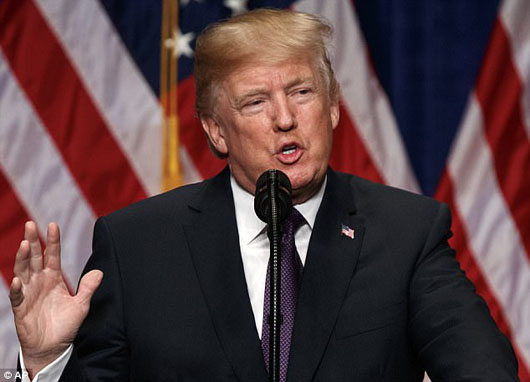by WorldTribune Staff, December 19, 2017
U.S. major media gave secondary play to President Donald Trump’s national security strategy address Monday, but certain world leaders were all ears.
Russia said the U.S. strategic plan has an “imperial character,” while China decried what it called a “Cold War mentality.”

Trump’s strategy, which he unveiled in a Dec. 18 speech, says that China and Russia “challenge American power, influence, and interests, attempting to erode American security and prosperity.”
Trump said China and Russia “are determined to make economies less free and less fair, to grow their militaries, and to control information and data to repress their societies and expand their influence.”
Dmitry Peskov, a spokesman for Russian President Vladimir Putin, told reporters on Dec. 19 that some of Trump’s references to Russia in the strategy speech struck Moscow as “imperial” and showed “an aversion to a multipolar world.”
Moscow “cannot accept that the country is treated as a threat to the security of the United States,” Peskov told reporters.
The Foreign Ministry in Beijing, which wields little power compared to the rapidly-expanding military, insisted that China has always been a contributor to global development and a protector of the international order.
“Cooperation is the only correct choice for China and the United States,” ministry spokeswoman Hua Chunying said.
The Global Times newspaper, published by China’s ruling Communist Party, said Trump’s report “reflects Washington’s reluctance to accept the reality of China’s rise.”
In the 68-page strategy, Trump said that Russia and China are “rival powers” of the United States but that Washington would seek a “great partnership” with them in a way that “always protects our national interest.”
Peskov said the strategy contains some “modest positive aspects, including the readiness to cooperate with Russia in areas where it is in the interests of Americans. This absolutely corresponds with our approach. Moscow likewise seeks cooperation with the U.S. where it is beneficial for us and as much as our American colleagues are ready to do so.”
Trump’s strategy also states that “the dictatorships” of North Korea and Iran “are determined to destabilize regions, threaten Americans and our allies, and brutalize their own people.” The president also repeated his criticism of the nuclear deal between Iran and major world powers.
In a speech broadcast live on state TV on Dec. 19, Iranian President Hassan Rohani said that “the nuclear deal will not collapse. Those who hope that Trump will cause its collapse are wrong.”
Meanwhile, U.S. national security adviser H.R. McMaster told the BBC in an interview posted online on Dec. 19 that Russia is engaging in “destabilizing behavior” and running “a very sophisticated campaign of subversion” to undermine free and open societies.
“Of course, we have to counter Russia’s destabilizing behavior and the sophisticated campaigns of propaganda and disinformation,” McMaster said.
“They’ll support very left groups; they’ll support very right groups,” he said. “What they want to do is create the kind of tension, the kind of vitriol that undermines our confidence in who we are. One of the most important things is to pull the curtain back on this activity and to expose it.”
Subscribe to Geostrategy-Direct __________ Support Free Press Foundation
